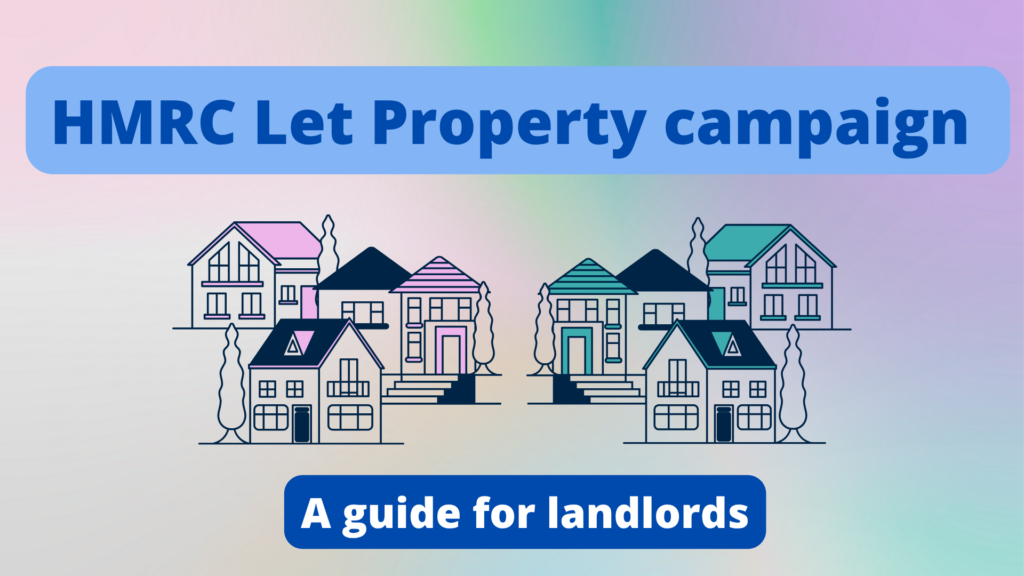The Let Property Campaign (LPC) is an ongoing initiative by HMRC inviting individual landlords to disclose previously undeclared rental income.

Whether it’s due to oversight, misunderstanding of the obligations or changes in personal circumstances, many landlords find that they have underpaid their tax.
The LPC provides a structured, fairly lenient pathway to correct any issues.
What is the Let Property Campaign?
The LPC is designed to help residential landlords bring their tax affairs up to date. It applies to individuals renting out property in the UK or abroad, including those letting:
- Single or multiple residential properties
- Holiday homes
- Rooms in their primary residence
- Properties as non-resident landlords
The campaign is not open to companies, trusts or those renting non-residential property such as shops or offices.
Why participate?
The primary benefit of using the LPC is reduced penalties. Normally, penalties for undeclared income can be severe – up to 100% of the tax owed for UK income and up to 200% for offshore income.
Under the LPC, HMRC is more lenient, often reducing penalties significantly or even waiving them entirely if you are cooperative and proactive.
Landlords who make a disclosure under the campaign avoid the risk of formal investigation, which could lead to higher penalties, interest and the potential to be publicly naming on HMRC’s deliberate defaulters list.
The Disclosure Process
The LPC follows a four -stage process:
1. Notify HMRC
Landlords must first inform HMRC of their plans to disclose through the Digital Disclosure Service. Once registered, they will receive a Disclosure Reference Number (DRN) and must then submit their full disclosure within 90 days.
2. Prepare the Disclosure
During the 90-day period, landlords must:
- Calculate their rental income and allowable expenses
- Determine the tax owed, including interest and applicable penalties
- Identify how many years of under-declared income must be disclosed
The number of years depends on the behaviour that led to the underpayment:
- Up to 4 years if the taxpayer took reasonable care
- Up to 6 years if the mistake was careless
- Up to 20 years for deliberate or concealed errors
Importantly, the LPC covers all undeclared income not just rental earnings. This could include other sources such as overseas income, dividends, or capital gains.
3. Submit and pay
The disclosure must be submitted online along with full payment. If immediate payment isn’t possible, landlords can contact HMRC to agree on a payment arrangement. Failure to submit within the 90-day window could mean losing any favourable LPC terms.
4. HMRC review and finalisation
Once the disclosure is submitted, HMRC will review it. In most cases, assuming the information is accurate and comprehensive, they will accept the disclosure without further queries. Landlords should keep records of all calculations and correspondence in case of future questions.
Past and future
Landlords should view the LPC not just as a one-time correction opportunity but as a prompt to keep improving their tax compliance.
HMRC is increasingly using data from letting agents, local councils, tenancy deposit schemes and the Land Registry to identify non-compliant landlords, so it’s a good idea to stay ahead and be proactive.
Also, Making Tax Digital for Income Tax Self Assessment (MTD for ITSA) starts from April 2026 for landlords with income over £50,000, and in 2027 for those earning over £30,000. Essentially, accurate reporting in digital form will soon be mandatory.
Need advice?
The Let Property Campaign is an important opportunity for landlords to correct past issues and keep any penalties to a minimum.
Professional advice is often worthwhile, and by acting now, you can avoid future penalties and prepare for the upcoming changes in tax reporting.
As Lune Vally accountants we help landlords with tax advice, accounting and more. Get in touch!

